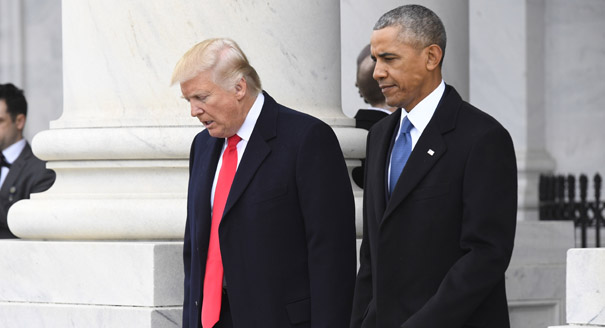Though both men would wince at the comparison, Donald Trump and Barack Obama are remarkably similar in their foreign policy approaches. Both are men who, when they took office, rejected the centrality of democracy promotion in America’s dealings with other countries. And both openly advocated for an agenda of political realism, describing their prime objective as the pursuit of America’s national interests.
Then again no administration comes into office vowing not to pursue America’s interests. However, in expressing their realism so bluntly, both men sought to draw a thick line between the administration of George W. Bush and themselves. Just as Trump has sought, almost obsessively, to distinguish his administration from that of Barack Obama, so too had Obama gone to great lengths to define himself as the opposite of Bush.
And then there is that singular failing that Trump and Obama share, for America’s misfortune and that of its allies: While both men have portrayed themselves as political realists in their dealings overseas, both have also played that role in a remarkably dreadful way. If realism is about accumulating and holding power in the world, the United States has lost considerable power under the presidencies of both men.
The Middle East is Exhibit A in this tale of decline. Nor should its suddenness be a surprise. As historian Niall Ferguson wrote in a fine essay for Foreign Affairs in 2010, imperial collapse usually comes far more quickly than historians imagine: “What if history is not cyclical and slow moving but arrhythmic—at times almost stationary, but also capable of accelerating suddenly, like a sports car? What if collapse does not arrive over a number of centuries but comes suddenly, like a thief in the night?”
Certainly collapse in the Middle East came like a thief in the night, and the person wearing the mask and gloves was Barack Obama. It was the former president, after all, who made a remarkable statement to Jeffrey Goldberg of The Atlantic in their long interview of April 2016. After justifying the U.S. pivot away from the Middle East to Asia, Obama told Goldberg: “The competition between the Saudis and the Iranians—which has helped to feed proxy wars and chaos in Syria and Iraq and Yemen—requires us to say to our friends as well as to the Iranians that they need to find an effective way to share the neighborhood and institute some sort of cold peace.”
No doubt such worthy thoughts make sense if you are teaching foreign policy in a classroom, based on an idealized notion of mutual best interests and the writings of John Stuart Mill. However, to hear this from a self-declared realist was jarring. The realist does not so blithely surrender up his allies, nor presume to lecture foreign states on what their higher interests are, even while informing them that his own country has decided to check out from their region. Rather, he defines his own national priorities, then by tooth or nail secures the clout to achieve them.
By reversing decades of U.S. policy in the Middle East and recognizing Iran as a state with legitimate “equities” in the region, Obama conceded power to a country that is unambiguously “realistic” and that interpreted his serene evenhandedness as an invitation to expand its own authority throughout the Arab world. Today, Iran is on the verge of succeeding in its defense of its Syrian ally Bashar al-Assad, over whom it retains much leverage. It has major influence in Iraq and Lebanon through the Popular Mobilization Forces and Hezbollah. It will also have a say in any solution in Yemen, while retaining a strong hand in Afghanistan and the Gulf.
That’s power. It’s measurable, it may be sinister, but it is the only currency used by realists, who are never partial to foreign policy lecturing.
With Donald Trump we’ve had a much rawer understanding of power. But where the previous president seemed bookish and preachy, the current one is noisy and vacant. He seems no better equipped to be a realist than Obama was. Trump bellows but carries no stick. He has pledged to contain Iran’s power in the Middle East, but seems utterly disinterested in helping to shape outcomes in the one country that will most define Tehran’s regional reach, namely Syria. Instead, Trump is now relying on Russia, a rival of the U.S., to take the lead there. As the region’s states scramble for a slice of postwar Syria, the U.S. soldiers on in its bubble, focused on defeating the Islamic State, paying scant attention to the broader Syrian condition.
The politics of the region are changing dramatically. America’s old allies are already preparing for a post-American era in the Middle East, a centerpiece of which is the rising antagonism between Iran and Israel. Russia, a genuinely realist power, is already taking on a choice balancing role in this potentially devastating confrontation, playing on the Iranian-Israeli rivalry to enhance its own sway. Trump appears to be unaware of this, and if he is it’s not clear what he intends to do about it.
When Obama and Trump embraced realism, they somehow forgot that the natural condition of states is to seek power. On the Middle East, Obama, instead, spent much time explaining why he preferred to direct America’s attentions elsewhere. Trump, in turn, has given abundant leeway to those striving to extend their own power in the region at America’s expense. If that’s realism, then there is something strangely unrealistic about it.






